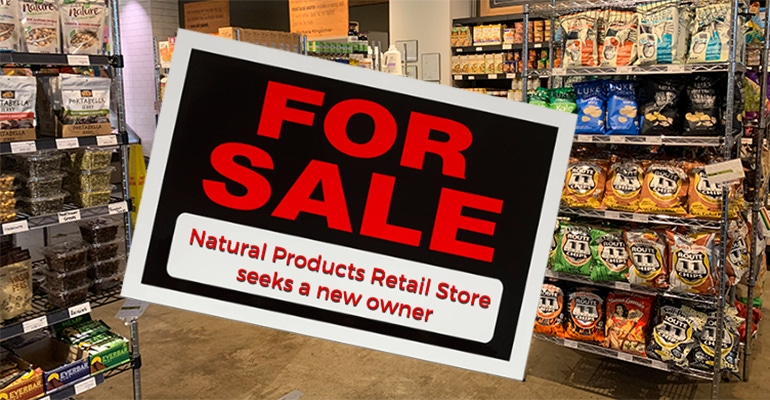July 28, 2022

For most natural products retailers, the decision to sell their business is not an easy or rash one. While some owners are fortunate to have children or key employees lined up to acquire their store or stores, many others have neither option. In these cases, they typically think long and hard about the right time to sell, to whom they'll sell and the best way to approach the process.
Luckily, the independent natural retail world is full of folks eager to help by sharing their knowledge and experience. We recruited three experts to offer their best advice on how to prepare a store for an eventual sale.
Consultant and former retailer

Find your 'why.' It is critically important to remember why you got into business in the first place and allow those priorities to guide the contours of the deal. The path to fame and fortune is not paved by small independent grocery stores, so there is a high probability that you won't be able to monetize the sweat equity required to keep a small business viable. I started Glen's Garden Market to make progress against climate change and nourish the community, so I sought out an acquisition partner who shared my commitment to the environment and was willing to extend the goals and mission of the business.
Assemble an advisory team. Three categories of advisors were essential to me when preparing my store for sale. One was strategic—someone to help me put the pieces together to tell my staff, roll the message out to the community and keep the faith of our vendors through my last day. I didn't want vendors to be nervous that they wouldn't get paid, which would've forced my successor to start on his back foot instead of starting with a robust store. Second, these are complicated contracts, so you need a lawyer with expertise in this subject matter. And third, you absolutely need a solid accountant, who, if they are great, could also be your financial advisor.
Be discreet. When looking for potential acquirers, if you just put the word out that you want to sell, your staff will find out. This needs to be handled more surgically and with the utmost discretion. I did research to figure out who might be a suitable, capable successor and then reached out to those people directly. This was never going to be a grapevine operation, or I would have blown my cover and diminished my team's confidence in me. Before telling anyone else, you need to solidify the deal, or else you'll create a real mess for yourself. The only partners who should know are the acquirer, the landlord if you have one, your accountant and your lawyer.
Operations and financial expert

Decide how you'll sell. On the financial side, consider how you're going to sell the business. Are you willing to carry a note? Most advisors would say no because, with a five-year note, the store could end up yours again in three years. Usually, they'll suggest taking steps to get the business qualified for SBA, which will help a buyer get approved more quickly. If you own the building, decide whether you'll also sell the real estate or keep it and lease the space, maybe as part of your retirement planning. Also look at your staff. If you're doing the job of three people, are you willing to stick around as a consultant for 18 months? If you want to walk out the day of closing, train up your management team to run the store without a lot of input.
Sweeten the lease. If you lease your space, make sure the terms are favorable for a potential buyer. If the lease is up in a year, for example, negotiate an extension with the landlord. If a buyer sees there is only one year left, they'll know right away that they may have to increase costs, whereas if there are seven years left, they'll have time to work something out with the landlord. Usually, landlords want to help tenants stay. Ask your lawyer and financial advisors when the right time is to communicate with the landlord. You don't want to wait until the last minute and surprise them.
Spruce up the store. When preparing to sell, think about a prospective buyer's perception the moment they walk into your store. If they see a few things in disrepair, they'll assume there is even more they'll have to repair. So take a good look around: Is there signage you've put off upgrading? Walls that need painting? Could the back room use a good spring cleaning? Has the parking lot needed restriping for the last few years? Are there repairs that have been delayed because you had no spare time during the pandemic? Just like when selling a home, these are investments that a store owner should make.
Business valuation specialist

Get a valuation. Owners should get some idea of the business's value to determine a selling price. They don't have to do this—they can come up with their own number or go by industry rules of thumb. But our organization understands this industry and selling environment very well, so we can come up with a selling price and help the owner understand why we think it's a good, approachable number. To prepare for a valuation, we'll ask the owner for three or four years of business financials and tax returns, which tell us everything we need to know about cash flow, margins, etc., to see how the business is doing. Plus, a potential buyer doing due diligence will typically ask for the same financial information.
Clean up the books. Sometimes owners do their own bookkeeping, or they hand the books to their accountant for taxes each year and don't pay attention to how the financials are organized or read. But to prepare for an eventual sale, you should start—ideally, three years out—making sure your balance sheet and income statements are accurate, understandable and free of anything that could confuse a potential buyer. For instance, does your balance sheet reflect the value of your current inventory? Are your margins appropriate? Any disconnects could create a trust issue for a buyer.
Ensure you're set financially. We highly recommend that the sale is wrapped within the owner's financial and retirement planning. Make sure all of your financial advisors are working together to ensure every aspect is accounted for. You might find out that you really shouldn't sell yet, that you can't afford to give up the income and just rely on the sale proceeds and your retirement accounts. We're also big advocates of legacy opportunities in which owners mainly want to mitigate income taxes and make the terms great for both parties. You want to give a good value to the next generation, but still gift it at fair market value. If you don't know what that is, you might take out less than you really need to retire on.
About the Author(s)
You May Also Like
.png?width=700&auto=webp&quality=80&disable=upscale)




